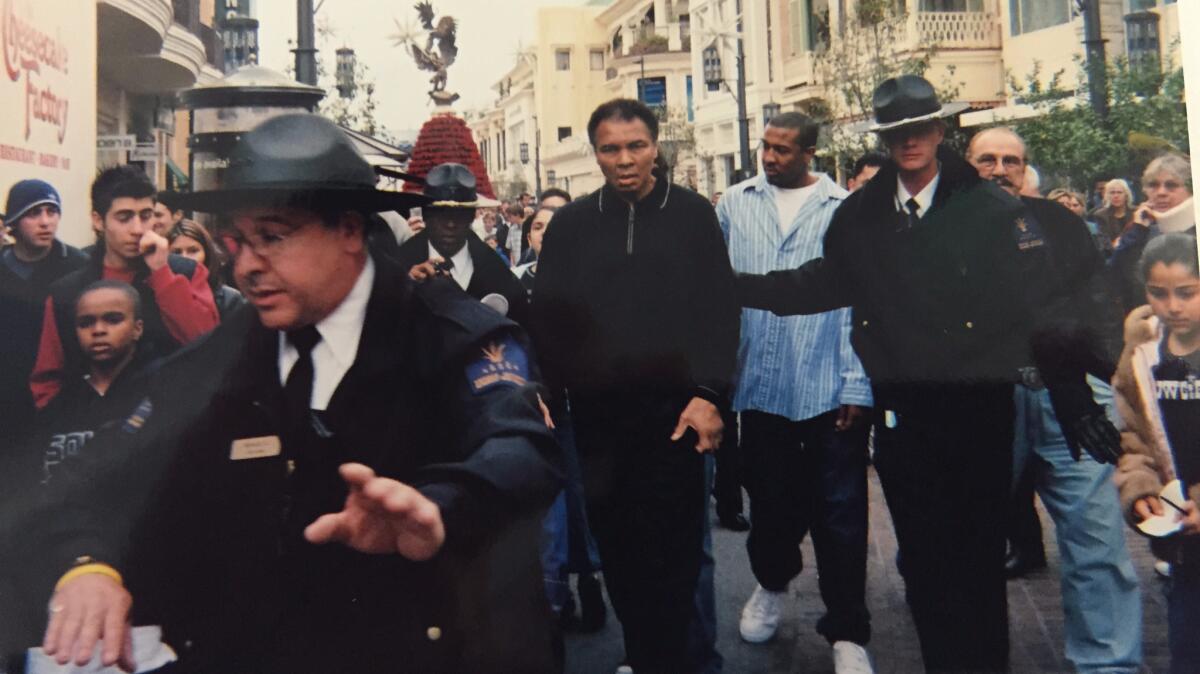Appreciation: That magical day Muhammad Ali visited the Grove and touched so many

I am proud to say I got to meet and shake the hand of Muhammad Ali about 10 years ago at, of all places, the Grove in Los Angeles.
I had just walked out of Barnes & Noble and was startled to see him sitting with a friend on a park bench in front of the store. There was no entourage and, to my surprise, no crowd around him.
I’ve never considered myself star-struck, but this was something different. Ali was no mere celebrity but an American folk hero. The heavyweight champion of the world. A civil rights leader. The heir apparent to Jackie Robinson.
Shaking with excitement, I quickly went over, introduced myself and shook his hand. He looked up and directly at me and, while he didn’t say anything, he nodded his head and smiled.
See the most-read stories this hour >>
I was knocked out. One of the great moments of my life. I ran to a nearby store to buy a disposable camera, and when I returned, there were several hundred people gathered around the champ. They were black and white, young and old, and all in awe.
I snapped a few pictures and immediately called my father to tell him the news. He was thrilled at my good luck. My father had been an amateur and professional boxing trainer and promoter for much of his life. One of the fighters he helped train was Humberto “Lefty” Barrera from Robstown, Texas. Like Ali, then Cassius Clay, Barrera was on the same U.S. boxing team that fought in the 1960 Olympics in Rome.
Clay went on to win the gold medal, which marked the beginning of his storied career. He would beat Sonny Liston for the World Heavyweight Championship in 1964, convert to Islam and change his name to Muhammad Ali. A short time later, he entered into the biggest fight of his life by refusing induction into the U.S. military as a conscientious objector of the Vietnam War.
His defiance came at a price. He was stripped of his boxing license and his title at the height of his career and convicted of draft evasion. Much of America turned against him. But he continued to fight for his beliefs. “Why should they ask me to put on a uniform and go 10,000 miles from home and drop bombs and bullets on brown people in Vietnam while so-called negro people in Louisville are treated like dogs and denied simple human rights. … I have nothing to lose by standing up for my beliefs. So I’ll go to jail, so what? We’ve been in jail for 400 years.”
The Supreme Court later would overturn his conviction, and Ali would forever be hailed as someone who embodied America’s ideals. He was not simply a boxer, but an outspoken champion for racial justice and religious freedom at a time when it was dangerous for a black man to speak out. When he shouted, “I am the greatest,” to me, what he was really saying to a racially charged America was, “I’m a black man and proud of it.”
He may have lost the “Fight of the Century” to Joe Frazier in 1971, but he eventually would win back his title and the love of his country. In 2005, President George W. Bush awarded Ali the Presidential Medal of Freedom, the country’s highest civilian award.
At the Grove that day, Ali shook hands with many in the crowd and posed patiently for photographs. Eventually, he slowly rose to leave — his hands and body shaking from Parkinson’s disease — as the crowd broke into applause. The people’s champion was back on his feet.
MORE
Ali once talked a man out of jumping off a building in Los Angeles
Muhammad Ali’s peers react to the passing of a legend
More to Read
Sign up for Essential California
The most important California stories and recommendations in your inbox every morning.
You may occasionally receive promotional content from the Los Angeles Times.










